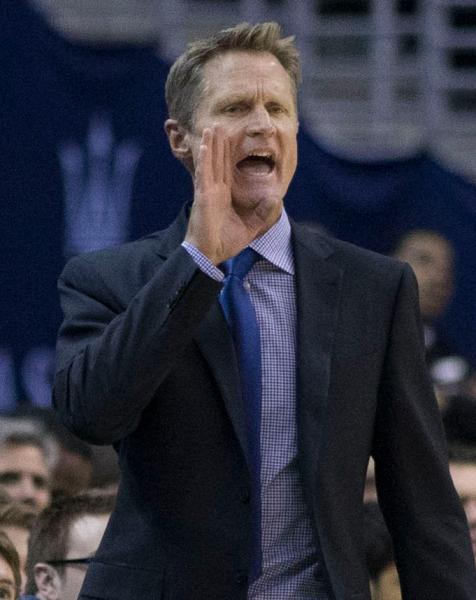Tuesday night marks the seventh straight NBA playoff game that Steve Kerr will miss due to debilitating back pain. It's been more than three weeks since the head coach of the Golden State Warriors said he had to leave the team because of the intense discomfort, and to seek additional treatment.
Despite this being the most important time for his team, Kerr is not expected to return to the Warriors bench this season, even if his juggernaut advances to the NBA Finals in June, as expected. That's how uncertain his situation is.
The lean and trim 51-year-old, whose undergone two failed back surgeries, cannot even manage sitting or standing – or a combination of both – in order to coach and travel to games, which is why Kerr stepped aside.
But during his announcement last month about his specific physical condition, he included some ill-advised medical advice for those in situations similar to his own.
"I'm not going to go into details on the symptoms. It's just discomfort and pain and it's no fun," Kerr said on April 23. "And I can tell you if you're listening out there, if you have a back problem, stay away from surgery. I can say that from the bottom of my heart. Rehab, rehab, rehab. Don't let anybody get in there."
Considering the amount of pain he's experienced since first going under the knife in 2015 to repair a ruptured disk – also called a herniated or slipped disk – it's understandable why Kerr said what he did. How ever, given his celebrity status and high visibility, he should have never offered medical advice of any kind, especially because every back problem is different, and no one approach is appropriate for every patient.
ever, given his celebrity status and high visibility, he should have never offered medical advice of any kind, especially because every back problem is different, and no one approach is appropriate for every patient.
"We really don't understand the spine very well, particularly the mechanics of the back. We apply a mechanical solution to what's not necessary a mechanical problem, given that there are nerves and muscles involved," says Charles Dinerstein, M.D., a Senior Medical Fellow at the American Council and retired vascular surgeon. "That said, while Kerr may have felt let down after two operations with no sustained relief, he should not have directed others with chronic back pain to stay away from surgery."
The Wall Street Journal reported this week that "[r]esearch has shown the procedure is more successful than nonsurgical treatment for patients whose pain has persisted for several months," and according to "Hyun Bae, a professor of orthopedic surgery at Cedars-Sinai Medical Center in Los Angeles, 'When you look at the data, it clearly shows the patients who had surgery had a faster and more reliable recovery.' "
Yet as many a back specialist will tell you, locating the source of back pain can be a very difficult thing to do. And even if it's located, coming up with a plan to treat it – and overcoming it – can be just as difficult, if not impossible. Unless it's under rare circumstances, even back surgeons won't recommend back surgery from the start, since it's often not the best approach – and the last option.
"While sufferers are often desperate, and they are experiencing neuropathic pain," adds Dr. Dinerstein, "in general it is almost never the first choice."
For those who have experienced a herniated disk and the pain "has not resolved within a few weeks, your doctor may suggest physical therapy. Physical therapists can show you positions and exercises designed to minimize the pain," according to the Mayo Clinic. Medications – including muscle relaxers and cortisone injections – can also be prescribed.
For Kerr, with enough time passed after recuperating from his first surgery, he began working out daily and incorporating yoga into his regimen to battle headaches, to help keep the pain at bay – which worked for awhile. But then he was afflicted by a rare complication from the original surgery: leaking spinal fluid, also called a cerebrospinal fluid leak, from a dural tear. That condition was addressed in his second operation in October 2015, but his awful pain has returned.
It's this complication that makes Kerr's situation even more unique, given that the cerebrospinal fluid leak occurs in roughly 1 in 20 disk operations. Just more reason for Kerr to have avoided telling the public to run from back surgeons.




